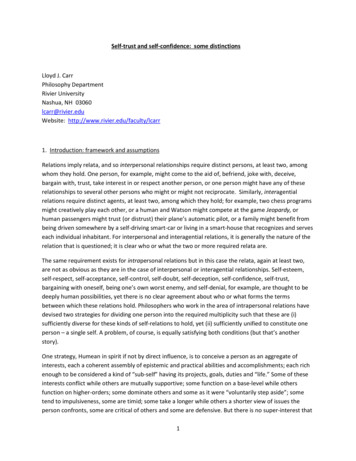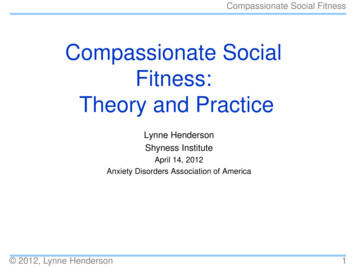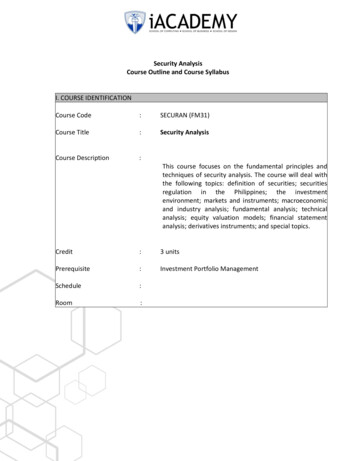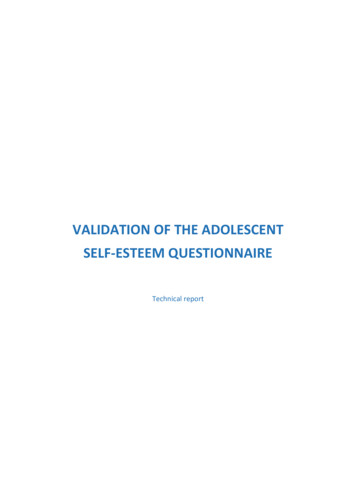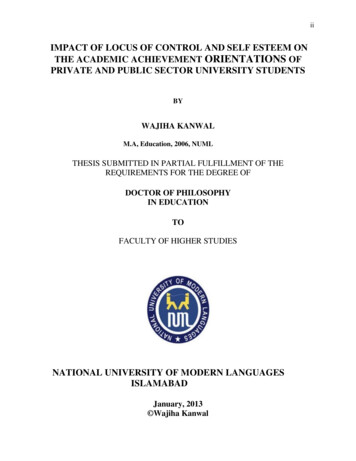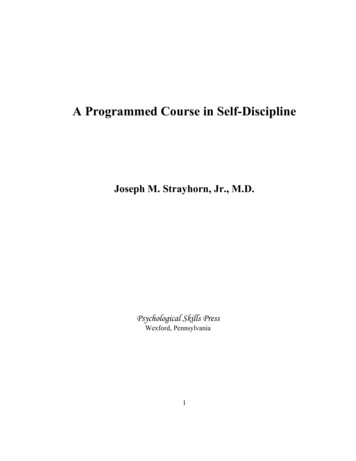
Transcription
A Programmed Course in Self-DisciplineJoseph M. Strayhorn, Jr., M.D.Psychological Skills PressWexford, Pennsylvania1
Copyright 2004, Joseph M. Strayhorn, Jr.Published by:Psychological Skills Press263 Seasons DriveWexford, Pennsylvania 15090www.psyskills.comAuthor’s email: joestrayhorn@juno.comISBN: 1-931773-10-62
ContentsIntroduction 5Checklist of Techniques for Meeting Goals 8Chapter 1: The Meaning and Worth of Self-Discipline 9Chapter 2: Types of Self-Discipline Choice Points 21Chapter 3: Attitudes Toward People With Self-Discipline Problems 42Chapter 4: What’s the Point of Self-Discipline? Choosing Goals 48Chapter 5: The Internal Sales Pitch 56Chapter 6: Plans for Goals: Overall Plans and Daily Plans 60Chapter 7: Finding the Right Place on the Hierarchy of Difficulty 67Chapter 8: Anticipating and Listing Self-Discipline Choice Points 72Chapter 9: Fantasy Rehearsal 76Chapter 10: Self-Reinforcement of Steps Toward Goals, or Internal Shaping 82Chapter 11: The Celebrations Exercise 86Chapter 12: External Reinforcement 90Chapter 13: Self-Monitoring 102Chapter 14: More on Advanced Self-Discipline 110Chapter 15: More on Work Capacity 117Chapter 16: Using Stimulus Control 129Chapter 17: Momentum Effects: Getting on a Roll 133Chapter 18: Organization Skills for Self-Discipline 138Chapter 19: Self-Talk and the Twelve Types of Thoughts 148Chapter 20: Modeling 156Chapter 21: Reading the Instructions 162Chapter 22: Time on Task 165Chapter 23: Ways to Restore Your Persistence Power 172Chapter 24: Other Ingredients for Success 182Chapter 25: Preparing for a Test 186Chapter 26: Doing Written Assignments 198Chapter 27: Improving Concentration 203Chapter 28: Thinking Before Acting 207Chapter 29: Kindness 211Chapter 30: Nonviolence and Respectful Talk 215Chapter 31: Sleep and Waking 223Chapter 32: Thrill-Seeking 229Chapter 33: Weight Control 2373
Chapter 34: Overcoming Addiction 245Appendix: The Psychological Skills Inventory 250Annotated Bibliography 254Index 2664
Introductionself-discipline is more important thanmemorizing state capitals. And eventhough I love teaching math, I mustadmit that many students will neverhave to solve a quadratic equation afterthey finish studying algebra. Butapproximately every day of their livesthey will be called upon to exercise selfdiscipline in some way or another. Whyis the skill of self-discipline not widelytaught, while vastly larger amounts oftime are spent on less crucial skills?Part of the answer to thisquestion is that until recently, we hadnot done sufficient research on selfdiscipline to know exactly what to tellthe student of this subject. And evennow, our research knowledge is stillrapidly accumulating. I’ve had theprivilege of reviewing this research ingreat detail. I feel that we now knowenough to teach students very usefulideas about how to cultivate thisessential skill.Another reason that selfdiscipline is not taught like other schoolsubjects is that time is in short supply,and time must be spent on “basic”subjects. The most basic of subjects arereading and writing. I thoroughly agreewith principals’ and teachers’ putting ahigh priority on reading and writing.For that reason, I have tried to make thisbook conducive to practice in bothreading comprehension and writing.Self-discipline is one of the mostimportant skills that a human being canpossess. It can make the differencebetween success and failure as astudent. It can determine whether or nota person is successful in a career. It canmake the difference between a happyrelationship and a failed relationship. Itcan make the difference betweenpeaceful conflict resolution andviolence.It is the ability to work for longterm goals, and to avoid gettingsidetracked onto whatever is mostpleasant at a given moment. Thuspossessing this skill lets a personaccomplish any long-term goal morereadily.It goes by various names, inaddition to self-discipline, most notablyself-control and skill in delay ofgratification.There are millions of peoplewho suffer greatly from shortage ofself-discipline skills. Yet if my clinicalexperience may be extrapolated, thefraction of these who have taken acourse in self-discipline, or who haveread one book about how to gain it, isapproximately zero. Those who havevisited doctors or therapists have oftenreceived little or no instruction in howto promote their own self-discipline.If this skill is so important, whyis it not more often systematicallytaught? Surely learning how to increase5
A Programmed Course in Self-DisciplineFor writing, practice is crucial toincreasing skill. One of the exercisesthis book stresses is the “fantasyrehearsal.” A fantasy rehearsal of selfdiscipline is a narrative of a successfuluse of this skill, which includes thethoughts, emotions, and behaviors ofthe person who is handling the selfdiscipline challenge well. Fantasyrehearsals can be written as well asspoken. For a student to accumulate alarge portfolio of written fantasyrehearsals of responses to self-disciplinechoice points is a major practice in thesubject of writing, as well as in thesubject of self-discipline.Another way of practicingwriting within this course is for thestudent to write essays on the “Topicsfor Writing or Discussion” at the end ofeach chapter. These should be asufficient challenge that almost almostall learners will not find the course “tooeasy.”If the learner has “tuned in” tothe information presented, answeringthe question at the end of each sectionshould not be very difficult. Thequestions help keep the learner activelyengaged, give the learner challenges,and make the learner more than apassive recipient of the information.The questions give a teacher an idea ofwhether the student is taking in theinformation.Some people, upon seeing that thelearner gets almost all the questionsright, infer that the material is too easyor that the learner already knows it.To improve readingcomprehension, a central exercise is forthe student to read a bit of informationand to answer a question on it. Indeed,answering questions on material one hasjust read is the main way in whichreading comprehension is tested, onindividual tests of readingcomprehension and group standardizedtests from first grade level up. Thisbook is written in the format where onequestion follows each small chunk ofinformation. The student who reads itcan get much practice in readingcomprehension.One format that is particularlyuseful is one in which a learner and apreceptor take turns reading sections toeach other. The learner answers thequestion on each section, and thepreceptor enthusiastically reinforces thelearner for correct answers.Another format that gives evenmore practice in reading comprehensionis one in which the preceptor and thetutor take turns reading the sectionsaloud; the learner answers the question;and the one who did not read the sectionaloud does a “reflection” of it, orparaphrases it in his or her own words.This is an even more rigorous anddemanding exercise in readingcomprehension and languageexpression. While it is possible to guessthe answer to a two-choice question halfthe time without comprehending thesection, it is not possible to doreflections of sections withoutcomprehending.6
IntroductionThis is a mistake. Getting questionscorrect means that the learner is payingattention and doing what should bedone. It doesn’t mean “Do somethingelse”; it means “Keep up the goodwork.”I am very interested in hearingabout your experiences in using thisbook. Any teacher or learner is invitedto email me at joestrayhorn@juno.com.7
Checklist of Techniques for Meeting Goals10. Celebrations exercise. Do you thinkback and recall your triumphs, andfeel good about them?11. External reinforcement. Do you useexternal rewards for your triumphs?12. Self-monitoring. Do you frequentlymonitor your progress toward yourgoal, using numbers?13. Advanced self-discipline. Do youuse techniques such as selectiveattention to learn to enjoy worktoward the goal?14. Work capacity. Do you use“exposure” and “habituation” toincrease your work capacity? Doyou believe in the effort-payoffconnection?15. Stimulus control. Do you avoidtempting situations?16. Routines and momentum. Do youtry to keep habits and precedents onyour side?17. Organization. Are you usingorganization techniques?18. Twelve thoughts. Do you chooseconsciously among twelve types ofthoughts?19. Modeling. Do you collect positivemodels, and avoid negative ones?20. Frequently reading instructions. Doyou keep reading about how toaccomplish this goal?21. Time on task. Are you devotingenough time to get the job done?22. Restoring persistence power. Doyou use techniques to restore yourpersistence power?How much do you use each of these, foreach particular goal?1. Careful goal selection. Did youselect the goal carefully, thinkingabout what is most ethical andworthy of your effort?2. Goal written, specifically. Have youwritten the goal, describingspecifically what achieving it wouldbe like? Do you read those wordsoften?3. Internal sales pitch. Have youwritten an internal sales pitch, anddo you read those words often?4. Plans. Do you write overall plansand daily plans for how you willachieve your goals?5. Hierarchy of difficulty. Do youmake resolutions that are neither toohard nor too easy for your currentskill?6. List of choice points. Have youlisted the most important selfdiscipline choice points?7. Decisions. Have you decided clearlywhat you would like to do, think,and feel in those choice pointsituations?8. Rehearsals. Do you often do fantasyrehearsals of triumphing in thosechoice points? Do you frequentlypractice the skills you need?9. Self-reinforcement. Do you use selfreinforcement for bits of progresstoward your goal, immediately aftersuch successes?8
Chapter 1: The Meaning and Worth of Self-Disciplinestudy time watching TV or playing withfriends.If you want to keep from gettingcavities, you have to spend timebrushing your teeth, even though itmight be more pleasant to skip that job.If you want to be more rested in themorning when it’s time to get up, youhave to go to bed earlier than you mightfeel like going to bed.If you want to have money to usefor something important, you have topass up the urge to spend all yourmoney as soon as you get it.q*What do these four situations havein common?What Is Self-Discipline?1. This course is meant to teach youone of the most important skills thatanyone can have: self-discipline.Having this skill means that you do wellin a certain type of situation, called a“self-discipline choice point” or a “selfdiscipline challenge.”In these situations, there issomething that you can do that youthink will make things come out betterin the long run. There is somethingdifferent that you could do, that wouldfeel better in the short run. Selfdiscipline means doing what you thinkwill make things better in the long run,even though it is less pleasant at themoment.q*Self-discipline involvesA. They all are self-discipline choicepoints,orB. some are for health and some are forachievement?a*a3. Here are some more examples ofself-discipline choice points.If you want to keep a friend, youkeep yourself from saying mean thingsto that friend, even though you may feellike it sometimes.If you want to win a mile run in atrack meet, you will have to run andwork out lots of times when it would bemore pleasant to lie around and relax.q*A. doing what feels best now,orB. doing what makes things turn outbest in the long run?a*b2. There are many different situationswhere you have to do something lesspleasant now if you want to getsomething more pleasant in the future.Here are some examples of those selfdiscipline choice points:If you want to do well on a test, youhave to study instead of spending all the9
A Programmed Course in Self-DisciplineB. the short-term bad taste of a drug andthe short-term fun of putting thingsaway?a*a5. All these examples have somethingin common. In all of them, if you wantsome really good thing in the future,you have to give up some pleasure orput up with some discomfort right now.The good thing in the future is calledthe long-term goal. The more fun thingyou have to give up is called thetemptation. In self-discipline choicepoints, choosing the temptation wouldget in the way of the long-term goal.A person has a goal of doingwell on a test. Watching TV or playingwith friends can be a temptation thatgets in the way of that goal.q*Another person has a goal of losingsome weight. If that person gets theurge to eat a whole apple pie all at once,that urge would beFor these two examples, what wouldyou call keeping a friend and winning atrack race?A. goals that you use self-discipline toget,orB. things that are pleasant now, but getin the way of your goals?a*a4. Here are more self-discipline choicepoints.If you want to have good judgmentand live your life well, you will have tostay away from a bunch of illegal drugsthat might make you feel good for awhile after taking them.If you want to get your work donewell, you will probably have to spendtime organizing your time and tasks andpapers, even though it would feel morepleasant to do lots of other things thanto get things organized.q*The short-term good feeling a drugaddict gets from drugs can be called atemptation that gets in the way of longterm goals. The fun of playing whenyou should be getting organized isanother temptation. What are the longterm goals those two temptations canmess up?A. a temptation,orB. a long-term goal?a*a6. Someone really wants to feel restedin the morning, and to be wide awakefor school during the day. But sheknows it will be fun to stay up reallylate the night before school. She decidesthat the pleasure of feeling rested andawake the next day is greater than thepleasure of staying up late.q*Which of these is the temptation?A. Having the good sense that you getfrom being off addictive drugs, and thework you get done by being organized,or10
Chapter 1: The Meaning and Worth of Self-Disciplinethree days from now! I’ll beembarrassed if it’s a bad grade.Temptation: Oh. But this show will beso interesting! It will be so much morefun than studying. Come on, just thistime?q*The part of the self who is arguing for aself-disciplined choice isA. the fun of staying up late,orB. feeling rested and wide awake thenext day?a*a7. We have been focusing so far on themeaning of self-discipline.q*What does self-discipline mean?A. the temptationorB. the long-term goal?a*b9. There is a lot more of the future thanthere is of the present. For that reason,it’s often very wise to use selfdiscipline. But the pleasure from thetemptation is available right now! Forthat reason, temptations are often hardto pass up.Suppose that someone reallywants to win a mile run in a track meet.He is thinking about whether to run andwork out or lie around and listen tomusic. He’s in the mood to lie aroundand listen to music at this time, but if hedoes so he’ll not have time to run today.q*The wish to lie around and listen tomusic isA. Avoiding things that are fun,orB. passing up temptations, to meetgoals?a*b8. In self-discipline choice points, thereis a contest between the temptation andthe long-term goal. The temptation is toget the most enjoyment and avoid themost discomfort right now. The longterm goal is to make things come outwell in the future.Sometimes it’s fun to think ofthe wish for the temptation and the wishfor the long-term goal as two parts ofyourself, and to make up a dialoguebetween them. For example:Temptation: Oh boy. Here comes agood television show. Of course I’llwatch it! It will be fun!Long-term goal: Not so fast! Aren’t youforgetting about me? I’m the one who’llbe taking that test tomorrow. I hate itwhen you don’t prepare me enough, andI have to guess answers. And I’m theone who’ll be getting back the gradeA. the temptation,orB. the long-term goal?a*aSelf-Discipline and Success11
A Programmed Course in Self-DisciplineIn the type of experiment Mischel madefamous, the long-term goal for the childis10. How successful do you want yourlife to be? Do you want to enjoy life,have good friends, have a happy family,do well in your job, have lots of money,and make the world a better place?There are lots of smart and talentedpeople who fail at these things, becausethey don’t have enough self-discipline.If you make very strong your skill ofworking toward long-term goals, andnot getting sidetracked by temptations,you have a much higher chance ofsuccess in life.q*The last section said thatA. Very few people have excellent selfdiscipline,orB. self-discipline makes success morelikely?a*bA. five marshmallows,orB. one marshmallow?a*a12. Remember that self-disciplinemeans passing up temptations so thatyou can be more likely to achieve along-term goal.q*In the type of experiment just described,the one marshmallow right now wouldbe called theA. temptation,orB. long-term goal?a*a13. Some of the children in thisexperiment could keep from eating themarshmallow for 15 or 20 minutes untilthe experimenter came back into theroom. Others ate it right away. Otherslasted for a while before eating it.This is a self-disciplinechallenge or choice point. The fivemarshmallows in fifteen or twentyminutes is the long-term goal, and theone marshmallow now is thetemptation. The task measured howmuch self-discipline the children hadfor that particular challenge.q*Why are five marshmallows in 15minutes called a long-term goal here?11. A man named Walter Mischel didexperiments with preschool agedchildren. Here’s an experiment that islike one of Mischel’s. Suppose youshow the child one little marshmallow,and say, “You can eat this now if youwant. But if you wait, and keep yourselffrom eating it, you can have fivemarshmallows when I come back intothe room. I’m leaving now.” Then youleave the room and leave the child alonewith the marshmallow. But you watchthe child through a one-way mirror orvideotape. You record what the childdoes. You time how long the child lastsbefore eating the marshmallow.q*12
Chapter 1: The Meaning and Worth of Self-Disciplinesuch as more improvement of the world,greater happiness in their own lives, andgreater contribution to others’happiness? If they choose worthy goals,I believe it’s likely. When you defineself-discipline as the ability to worktoward goals without gettingsidetracked by the temptations, it’smuch more likely that more selfdisciplined people will meet their goals.q*The above paragraph implies that of allthe goals that are fostered by greaterself-discipline,A. Because they were the payoff thatthe child had to pass up a temptation toget, in this experiment,orB. because marshmallows are typical ofthe types of payoffs people usually useself-discipline to get in life?a*a14. Years later, Walter Mischelmanaged to find most of these childrenwhen they had gotten to be high schoolkids. He asked their parents to rate howgood they were at making decisions. Healso looked at their SAT standardizedtest scores. The children who had beenable to wait longer for the biggerreward, the ones who were more selfdisciplined, were rated as betterdecision-makers by their parents, andthey also did better on the SAT test.q*Which explanation for why these kidsdid better on the SAT test fits betterwith the point of this experiment?A. nothing is more important than SATscores,orB. making a contribution to others’happiness, and to your own, is moreimportant than test scores.a*b16. What if the preschool children whocouldn’t wait for the five marshmallowsin Mischel’s experiment had been ableto study and practice the ideas in thisbook, very carefully? Could they haveimproved their ability to wait formarshmallows? Could they have gottenbetter SAT scores? Could theycontribute more to the world and behappier?The idea of this book is that youdon’t have to stick with the same degreeof self-discipline that you had as apreschooler. You can improve the skillof self-discipline just as you improveany other skill such as typing or dancingor playing the piano or doing math. OneA. They were just smarter,orB. they had the self-discipline to studymore, to check their answers morecarefully, or to concentrate instead ofdaydreaming?a*b15. Doing well on the SAT test can bevery important for someone’s career.But it’s certainly not the highest andmost important goal of living. Do youthink it is likely that the Mischel’s moreself-disciplined children will eventuallygo on to achieve more important goals,13
A Programmed Course in Self-Discipline18. In a movie, Lawrence of Arabia,the main character did an exercisewhere he closed his fingertips upon thehead of a burning match. In this coursein self-discipline, do we recommendthat you get some matches and lightthem, and train yourself to put them outin this way, even though it will blisteryour fingertips? Would this be a goodexample of self-discipline?This certainly would representchoosing an option that is not pleasantin the short run, wouldn’t it? Butsomething is missing. Where is thelong-term payoff? What is the goal thatis accomplished? Maybe the manwanted to prove to himself that he couldput up with pain. Sometimes it’s veryuseful to prove this to yourself. Butcouldn’t he have picked a way to do itthat wouldn’t hurt his body? Selfdiscipline does not mean hurtingyourself for no good reason.q*If you agree with the last paragraph,which of the following ways to practiceself-discipline will you think is better?of the most important ways to improveany of these skills is to practice it.q*The author of this book believes thatA. self-discipline is a skill in which youcan improve,orB. self-discipline stays the samewhatever you do?a*aSelf-Discipline Is Not A Fear ofPleasure or a Wish for Pain17. Someone says, “I don’t want to beself-disciplined. I want to have fun!”This person probably doesn’t rememberthat self-discipline is not just passing upsomething pleasurable. It’s passing upsomething pleasurable in order to getsomething even better later. People withvery low self-discipline tend to be veryunhappy, and those with high selfdiscipline tend to be much happier.Self-discipline is giving up amarshmallow to get five of them later;it’s not just throwing the marshmallowaway!q*The idea you’ve just read is thatA. sticking needles through your skin,orB. passing up junk food for a while?a*b19. Passing up something pleasant ordoing something unpleasant makessense when it helps you work toward aworthy goal. There are lots of worthythings that need to be done in thisworld, that require lots of self-A. using self-discipline makes youmuch happier than failing to use it,orB. the people with no self-discipline arevery happy but they don’t get muchwork done?a*a14
Chapter 1: The Meaning and Worth of Self-Disciplinea*b21. Some people, especially teenagedfemales, have a problem called anorexianervosa. They pass up the pleasure offattening food. They also pass up thepleasure of nourishing food. They getskinnier and skinnier. They would looklots better if they gained weight. Someof them actually die from not eatingenough. It is very hard to pass up foodand stay hungry all the time. But thegoal if thinness gets pushed so far that itisn’t useful, and in fact is harmful.q*Is it a great example of selfdiscipline when someone with anorexianervosa passes up food?discipline. It’s not necessary to douseless things to practice self-discipline.q*Which of the following two activitiesdo you think the author likes better as away of practicing self-discipline?A. Working very long and verycarefully to help build a house forsomeone who couldn’t otherwise affordone,orB. taking a long hike out into the woodsand back again, while putting up withlots of biting insects and thornybrambles?a*a20. Some people (not very many) try topass up pleasure, even when thepleasure does not get in the way of along-term goal. A word that describesthis philosophy is ascetic. This courseteaches something very different: thatpleasure is good, but we often have topass it up in order to accomplish aworthy goal in the future.q*If you agree that the point of selfdiscipline is to accomplish a worthygoal, not just to prove you can takepain, which of the following two waysof practicing self-discipline will youlike better?A. Yes, because you have to be verytough and strong to do this,orB. No, because extreme thinness that’sdangerous to health is not a worthygoal?a*b22. Anorexia nervosa is not a goodexample of self-discipline, for the samereason we talked about earlier. Whenusing self-discipline, you pass uppresent rewards to get better rewards inthe future. You don’t pass up presentrewards to get results that harm you orpossibly even kill you.Fear of pleasure and wish forpain are NOT good things to have. Selfdiscipline is a very good thing to have.It’s very important for people to be ableto know the difference.q*A. seeing how long you can stand infreezing weather without a jacket,orB. seeing how long you can do mathproblems with speed and accuracy?15
A Programmed Course in Self-Discipline24. In the situations where you don’thave to choose between present fun andfuture fun, it’s good to be able to enjoythe present. I once saw a video of a mannamed Richard Feynman, having funwith his friends. He was banging upon abongo drum, and chanting, over andover, “Oh, I like my orange juice! Oh, Ilike my orange juice!” He was having agreat time acting silly. When he wasn’tbanging on bongo drums, he did someof the most productive and brilliantwork in physics that the world has seen.His chanting party was not a failure touse self-discipline. His gleefulnessprobably made it easier for him to useself-discipline later on.Productive people know how to“recharge their batteries.” They knowthat self-discipline is easier to do whenyou also get some present enjoyment.Having fun is not in competition withbeing self-disciplined. The twocooperate with each other. It’s easier touse self-discipline if you can have fun,and it’s easier to enjoy yourself if youcan use self-discipline.q*The author believes that self-disciplineisThe person with self-discipline usuallyA. puts off pleasure now so as to be lotshappier later,orB. puts off pleasure now so as to bevery miserable later?a*a23. Suppose you see someone goofingoff with a friend. She and her friend arelaughing, saying silly things, and havinga great time. The result of this is thatthey feel friendlier to each other thanthey did before. Now would someonemore self-disciplined have sat lookingstone-faced and serious instead? Theperson in this little story could havebeen one of the most self-disciplinedpeople in the world. She was not in aself-discipline choice point. She didn’thave to delay gratification. It wasperfectly fine for her to have fun in thisway. Self-discipline means makinggood choices. Choosing to have funwhen it’s a good idea is something thattruly self-disciplined people do well.q*When you get the opportunity to dosomething pleasurable right now, doyou always have to put it off till later, ifyou want to be a self-disciplinedperson?A. easier if you have good skills ofgleefulness,orB. harder if you have good skills ofgleefulness?a*aThree More ConceptsA. Yes, because that’s what selfdiscipline is,orB. No, because not all situations areself-discipline choice points.a*b16
Chapter 1: The Meaning and Worth of Self-DisciplineAnother example of habituation is25. A very close relative of selfdiscipline is called work capacity. Howmuch work of a certain sort can you getdone in a day, week, or year? How longcan you keep working at one timewithout needing to stop? How quicklydo you get a burning desire to stopworking and entertain yourself bygoofing off for a while, versus howmuch can you entertain yourself whileworking toward your goals? The abilityto keep working toward a goal, ofcourse, helps very much in achievingthat goal.q*A different way of saying the previoussentence isA. getting used to swimming in coolwater, once you’ve been in it a fewseconds,orB. deciding which goals are mostimportant?a*a27. I made up the phrase advanced selfdiscipline to refer to a very importantaccomplishment. When you useadvanced self-discipline, you graduallytrain yourself to enjoy the activities andchoices that accomplish your long-termgoals. For example, someone starts onan exercise program. At first, it is veryunpleasant to exercise. The person usesordinary self-discipline to make himselfkeep running. But gradually, somethingchanges. The person trains himself totake pleasure from running. He looksforward to his runs. Now his long-termmotive and his short-term motive areless in conflict with each other. He canuse some of his self-discipline energyon something else.q*Advanced self-discipline meansA. greater work capacity increases yourchance of success,orB. you should not take breaks from yourwork?a*a26. Part of the way people increase theirwork capacity and their self-disciplineis by habituation. Habituation means“getting used to it.” Someone at firstcan’t stand to do homework for morethan fifteen minutes without stopping,but he pushes himself do work forlonger and longer. The more experiencehe gets with working for longer times,the more he gets used to it. It isn’t sounpleasant as it was before. As hehabituates to working, he becomes ableto work for a couple of hours withoutstopping.q*A. being so tough that you can put upwith any amount of pain to reach yourgoal,orB. training yourself to enjoy doing whathelps reach your goal?a*b28. A student doesn’t like math. Thestudent starts devoting lots of effort17
A Programmed Course in Self-Disciplineq*The situation Dierdre finds herself in iscalledtoward getting better at math. At first,this effort is unpleasant, and it takes lotsof ordinary self-discipline for thestudent to make herself keep going. Butafter working very hard for many days,the student gets skilled enough that shecan see the beauty and the fun in math.She starts to enjoy it. She looks forwardto it. Now she doesn’t have to use up somuch energy
Chapter 1: The Meaning and Worth of Self-Discipline What Is Self-Discipline? 1. This course is meant to teach you one of the most important skills that anyone can have: self-discipline. Having this skill means that you do well in a certain type of situation, called a "self-discipline choice point" or a "self-discipline challenge."
